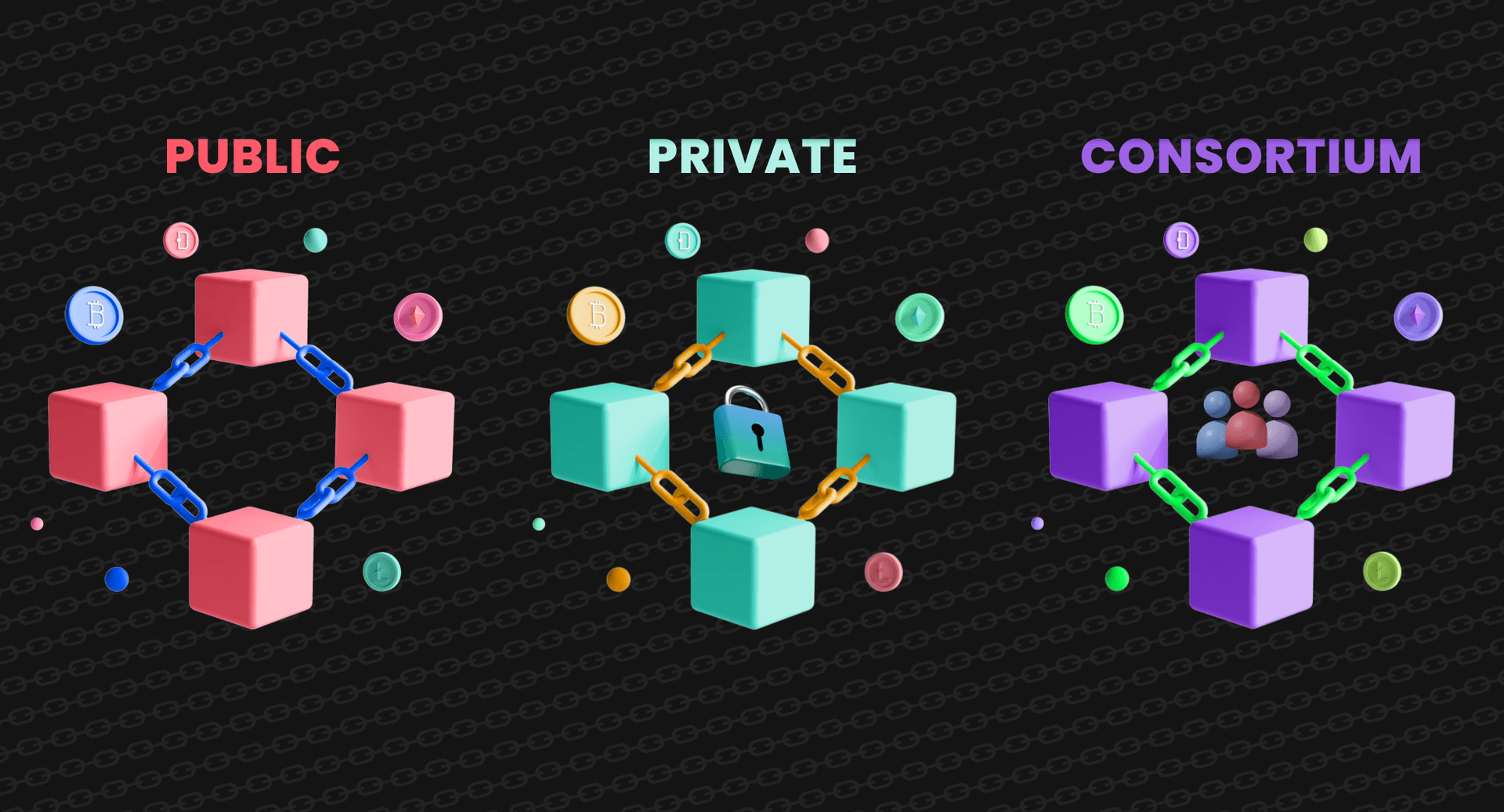

Types Of Blockchain & Their Use Cases
Bitcoin, being the most popular cryptocurrency, started giving blockchain technology the respect it deserved.
With the introduction of Bitcoin to the world, the most popular type of blockchain network was introduced to the market which was the Public Blockchain. Before diving deeper into the types of blockchain networks and their use cases, let us have a look at the broader division of it.
Blockchain technology or network is categorized into 3 broad divisions i.e.:
- Public Blockchain network
- Permissioned or Private Blockchain network
- Federated or Consortium Blockchain network

What is a Public Blockchain Network?
A Public blockchain network or popularly known as the permissionless blockchain network is a network that runs purely on algorithms and is not governed by any organization or a single person.
You can use this network freely, and it's open to everyone worldwide. It is the public blockchain network where almost all the cryptocurrencies work and are thus available for public use.

Some examples of Public Blockchain networks are Bitcoin, Ethereum, etc. where one can access everything related to these cryptos sitting anywhere in the world.
What is a Permissioned or Private Blockchain Network?
This blockchain network is confined to organizations. While using a private blockchain network allows the companies to set controls on who can access the network.

Only the ones who are given access are permitted to use the network otherwise no one outside the organization can access any data in a private blockchain network.
Oracle is a notable example, illustrating the power of private blockchain networks in maintaining data exclusivity.
What is a Federated or Consortium Blockchain network?
Lastly, in this type of blockchain network, the mining process is closely controlled by a selected number of stakeholders who are selected prior to the network launch. No alterations are accepted in the number of stakeholders after the network is launched.
Hyperledger is one such type of network where only pre-selected members are allowed to access the data of the network thus, making this network semi-private. This was a piece of brief information about what are the types of blockchain networks and how they are being used by different people, organizations, etc.
Moving forward, let us discuss what are the use cases of these blockchain networks in different work areas.
Although there are numerous use cases of the blockchain network, a few of them are mentioned below:
Capital Markets
Blockchain technology enhances the capital market's efficiency by providing real-time updates to issuers, investors, and regulators. It reduces risk and ensures liquidity, appealing to investors looking for greater returns with minimized risk.
In the capital market, if you are an investor you would love to reduce the risk which in turn would give you a greater return. Blockchain technology helps exactly that way by ensuring liquidity which is one of the most important aspects that an investor thinks about before stepping into the capital market.
Media And Entertainment Industry
Blockchain's impact extends to content creators, digital agencies, and media startups. It enables peer-to-peer transactions, eliminating intermediary-based licensing contracts. In influencer marketing, blockchain offers a unique pay-per-use model that benefits both artists and companies.
Sports and E-Sports
Blockchain's impact extends to content creators, digital agencies, and media startups. It enables peer-to-peer transactions, eliminating intermediary-based licensing contracts. In influencer marketing, blockchain offers a unique pay-per-use model that benefits both artists and companies.
Healthcare and Medical Science
Blockchain addresses data privacy concerns in healthcare by decentralizing databases, granting access only to authorized individuals when necessary. Additionally, it enhances supply chain transparency for medical resources worldwide.
Conclusion:
The applications of blockchain technology are both diverse and promising. As it continues to evolve, blockchain offers solutions that capitalize on cryptography, decentralization, transparency, and automation. NFTs, cryptocurrencies, DAOs, and more are emblematic of the blockchain revolution.
Understanding these concepts is not just a trend; it's a journey into the future of technology. Blockchain's capacity to champion these principles positions it as a driving force in the modern world.
(Click here to Learn All About Polygon zk-EVM)
